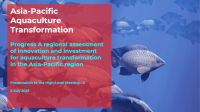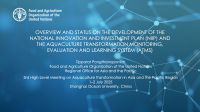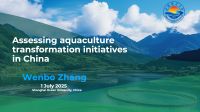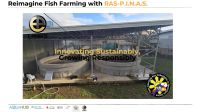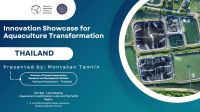This video by Mike Phillips, CEO of FutureFish, explores the current state of aquaculture innovation and investment across the Asia-Pacific region. Technology innovation is advancing, especially for higher-value species, but challenges remain in scaling inclusive value chains and building climate resilience. Despite growth in private investment, significant financing gaps persist—particularly for SMEs and smallholders, who make up 90% of the sector. National policies, governance, and regulatory environments strongly influence the adoption and scaling of innovations.
The presentation highlights the importance of partnerships, innovation hubs, and better alignment between financing and transformation priorities to achieve sustainable and inclusive aquaculture development.
Development of National Innovation & Investment Plans & Aquaculture transformation monitoring system
This video by Tipparat Pongthanapanich, FAO, provides an overview of the development of National Innovation and Investment Plans (NIIPs) and the regional Aquaculture Transformation Monitoring, Evaluation and Learning System (ATMS). NIIPs aim to guide each country's strategic priorities for innovation and investment in aquaculture through 2030, aligned with the regional transformation vision. ATMS will support regional progress tracking and knowledge sharing.
An FAO-led technical cooperation project project is supporting the pilot development of NIIPs and ATMS in four countries - India, Thailand, Viet Nam, and the Philippines - with a view to wider regional application. Key components include strategic visioning, policy alignment, project formulation, and robust monitoring systems to drive inclusive, sustainable aquaculture development.
This video by Wenbo Zhang, Shanghai Ocean University, presents an overview of China’s aquaculture transformation journey as part of the broader “Blue Revolution.” It highlights trends in global aquatic animal production and outlines key challenges such as land use changes and environmental pressures.
The presentation details a series of national policies and strategies introduced since 2019 to promote green, healthy, and high-quality aquaculture development ranging from pond standardisation and deep-sea farming to innovation-driven investment and value chain upgrading. It also reviews recent actions supporting ecological farming, wastewater treatment, reduced chemical use, and improved germplasm resources, and introduces efforts to assess the impact of these transformation initiatives across the sector.
This presentation by Elisa Claire Sy of E-Primate, showcases how RAS-P.I.N.A.S - a closed-loop, water-efficient technology - enables high-density, land-based fish farming using biofiltration, aeration, and mechanical treatment strategies. Discover how RAS conserves water and land, minimises disease risk, and offers flexibility in farm siting, while recognising the trade-offs of energy demands and infrastructure costs. Learn why RAS is gaining momentum as a key innovation in Asia's sustainable aquaculture future.
This video by Montakan Tamtin, Department of Fisheries, features two presentations from Thailand’s delegation to the 3rd High-Level Meeting on Aquaculture Transformation in Asia and the Pacific Region. The first showcases innovation and nature-based solutions in aquaculture via the IDRC-funded AQUADAPT Project; the second presents Thailand’s pilot initiative for low-carbon shrimp farming under an FAO Technical Cooperation Programme.
